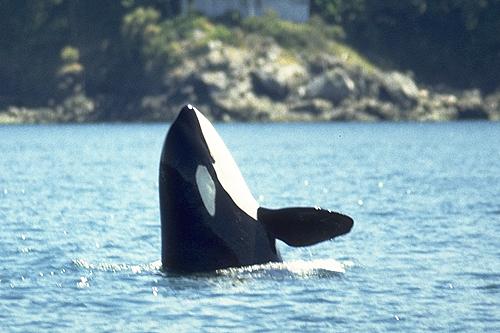

Orcas have many, many names, in the English language alone, and especially around the world. This page is going to dive into the often self-contradicting world of Names for the Orca Whale, and try to explain some of the titles the largest dolphin in the world has earned for itself. Enjoy!
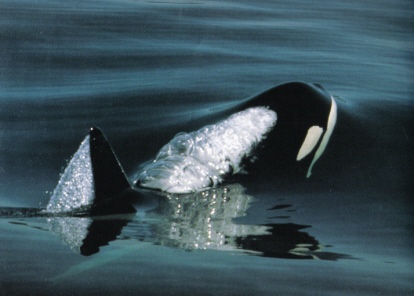
English
Orcas have many names in the English language. The two most common are orca and killer whale.
Killer Whale was for a very long time the most common name for these animals. The name actually has an interesting origin; overseas, whalers and fishermen saw orcas hunting large whales. They told english-speaking people that the orcas were 'whale-killers'. However, in the translation, someone messed it up and got it backwards, so instead of 'whale-killers' they became killer whales. Some people say this is insulting for the whales, because it implies that they are vicious killing machines. Indeed, before we began to study them, 'killer whales' were regarded as just that. The demand for a name change produced another name....
Orca became a popular name for these whales recently, and its popularity is climbing. However, for those people who think this is a more whale-friendly term, orca isn't exactly the most delightful name either. Orca comes from the scientific name, Orcinus Orca, which is usually translated as 'demon of the underworld', or something like that. A more literate translation is, 'of or belonging to the kingdom of the dead'. Not exactly a complimentary name! Also, the use of these two names, killer whale and orca, have lead many people to believe they are two separate species, creating MORE confusion! Personally, I use orca most of the time, just because I'm used to it.
Other names for the orca have worked their way into the English language as well. Blackfish was a common name for them along the BC coast for many years. Grampus was also a common name for them, but has since died out. Instead, grampus is used as a name for Risso's Dolphins. Off Eastern Canada, the orca is referred to as swordfish, while shorter versions of previously used names have created just plain killer and orc. In St Vincent, Lesser Antilles, they are known as Whitefish, oddly enough, contrasting with the often-used nickname of blackfish!
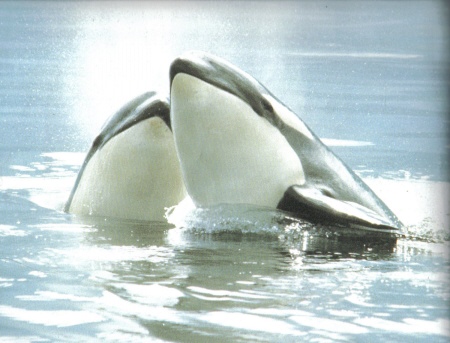
Native Languages
Obviously, the Natives had learned to respect the orca many years before Europeans even knew about them. Especially along the British Columbian coast, native tribes had many legends and names for the orca. Some names indicated their fear of the whale, while some indicated the respect and awe they felt towards them.
Ska-ana became a fairly well known name for the orca when a captive orca was named Skana after it. Ska-ana was the word the Haida people of the Queen Charlotte Islands used for orcas. Ska-ana, also spelt Skana and Ska'ana, means, roughly, killer demon, or supernatural spirit, or power. The Skana (killer demon, in this case) is a prominent figure in Haidan myths.
Other native names include aaxlu from the Inuit of North Alaska, takxukuak from the Chugach of South Alaska, axlot from the Tanaina of Cook Inlet (in Alaska), mesungesak and agliuk from the Yupik and Aleut of Alaska, respectively, polossatik, meaning 'the feared one', from the Aleut of Kodiak Island Alaska, and kit from the Alaskan Tlingit. All those from Alaska alone! In other parts of North America, the Kwakiutl of BC called the orcas mahk e-nuk, and the Nootka, also of BC, called them qaqawun. In Greenland, the Inuit called the female orcas ardluk and the males ardlursak.
In the Chukotski Peninsula of Russia, the Inuit call the orca, niss'onkhgyssyak(don't ask me how to pronounce that). Another Inuit name, from Northern North America, is arluq.
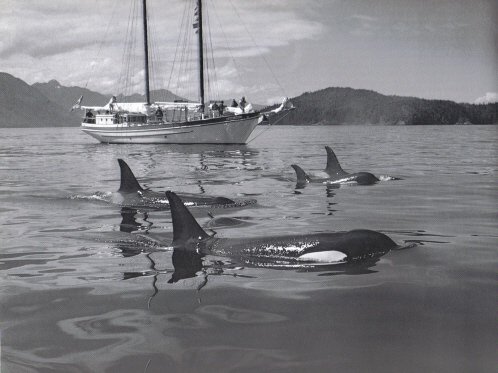
Other Languages
The orca has a million names in a million languages, most of them referring to their famous appetite.
Most Spanish languages, or Spanish-like languages, refer to the word 'orca'. In Brazil, they do just call the whales orca. In Mexico, they call the males orco and the females (or either) orca. This also occurs in Spanish America and Spain, while Italy and Portugal call them all orca.
The French have a few words as well. In Quebec, Canada, the orca is referred to as either épaulard or espadon, which means swordfish. The swordfish idea pops up again in France, where épee de mer, which means sword of the sea, is one of the common names, the others being orque and épaulard again.
The idea of a 'sword-whale' pops up many times, as you will see. One noticeable example is in the Netherlands, where orca shares the title of common name with zvaardwalvis, meaning sword-whale, and zvaardvis, meaning swordfish. Germany also follows the tradition of the sword-whale. Although one common name, Mörderwal, means 'whale-murderer', the other two share the sword concept. Schwertwal and Schwertfisch mean sword-whale and swordfish, respectively.
More names! In Tierra de Fuego, in South America, the word is ëpaiǎci, only with more accents that I counted find on the computer! A line and a single quotation mark above the first A, and an up-arrow underneath the first I. In Scotland, the orca is known as the pictwhale, while in the former Czechoslovakia, the word(s) was/were kosatka drava. Similarly, in Russia, the common names are kosatka, kasatka, and svinka. The Russian apparently weren't as harsh on the predators-kasatka can also mean 'darling'! In fact, Kasatka is a popular name for orcas. The matriarch of the Sea World California orcas is Kasatka, while a wild L-Pod female, L82, is also named Kasatka!
Other languages were also more complimentary to the orcas. In Japan, the common names were sakamata, sadshi, and shachi. Shachi, another popular orca name (one captive whale named Shachi lived in Izu-Mito Sea Paradise, while J41/Shachi recently became a mother!), can mean 'blessing'. On the small island of Ainu in Japan, the word for the orcas is repun kamai, which meant 'master of the open sea'.
Staying in Asia, on the Kuril Islands in Russia, the common names were nookur and dukulad. In Korea, they are called innuatu. And in Sibera, the word was/is: wúli-yū’nin only with a ` on the first 'n' of 'nin'.
In Denmark, they weren't so complimentary. Svaerdval means 'sword-whale'. The other three common names are tandthoye, hvalhund, meaning 'whale-dog', and spaekhugger, meaning 'fat-chopper'.
Fat-chopper was actually quite a popular name. Sweden also adopted it, spaekhuggare. So did Norway, but I'm leaving Norway until last, since they have SO MANY common names! Finishing off the other European counties, in Lapland, the common names are akan and fakan. In Iceland, they called the orca hahyrningur, hahyrna, sverdfiscur (swordfish), and huyding.
Ok and on to Norway! Since Norway has such a dense population of orcas, they have many, many names. Spaekhogger, and spakkhogger mean 'fat-chopper' as well, while vaghund, meaning hunting together like dogs, and vagnhogg, meaning hunting together for fat or blubber, refer to the orca's pack-style of hunting. Another popular theme was commenting on the orca's tall black dorsal fin, likened often to a pole, such as in the last three names. Staurvagn, which can mean farmer's pole, or 'swinging back and forth', staurhynning, which means 'pole-shaped horn', and staurhval, which means literally 'pole-whale'.
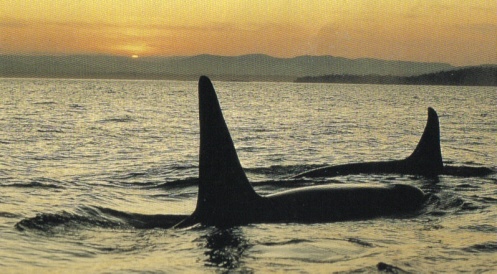
Scientifically
The common name for the orca isn't the only one in debate. The scientific name has been bounced around a lot too. Because of their world-wide distribution, and their individual societies, distinct hunting techniques, and slight differences in appearance, many scientists say that there should be more than one species of orca. At the very least, they say, there should be subspecies.
Currently, the only species officially is Orcinus Orca, which is a rather uncomplimentary name meaning 'of or belonging to the kingdom of the dead'.
Other species have been suggested. One of my favourites was called Orca gladiator referring to the warrior-like hunting of the whales. One of the more recent names was one suggested by Russian biologists, Orcinus glacialis, meaning it exists in the Antarctic. Mostly, though, these names aren't really taken seriously.
Antarctica has proven to be an especially confusing place. Recent studies by Dr. Robert Pitman have shown that there are three types of killer whales living there-Type A, which hunts minke whales, Type B, which has a large eyepatch, a 'dorsal cape' of gray shading on the back, and hunts seals, and Type C, which has a slanted eyepatch, is smaller, and hunts toothfish. They don't interact, like the transients and residents, and Dr. Pitman is proposing new species-we'll be watching to find out what happens.
Most likely, more names will be suggested and forgotten. The differences in orcas around the world-slightly different colours, different sizes, definitely different food, is probably like the difference between transients and residents in BC. These different 'species' of orca are most likely different races, like different races of humans. But, time will tell, and there's sure to be more debate on the orca's many names in the near future.
Above photos: Except for the Stefan Jacobs one, all photos were scanned from Killer Whales by John Ford, Graeme Ellis and Kenneth Balcomb.